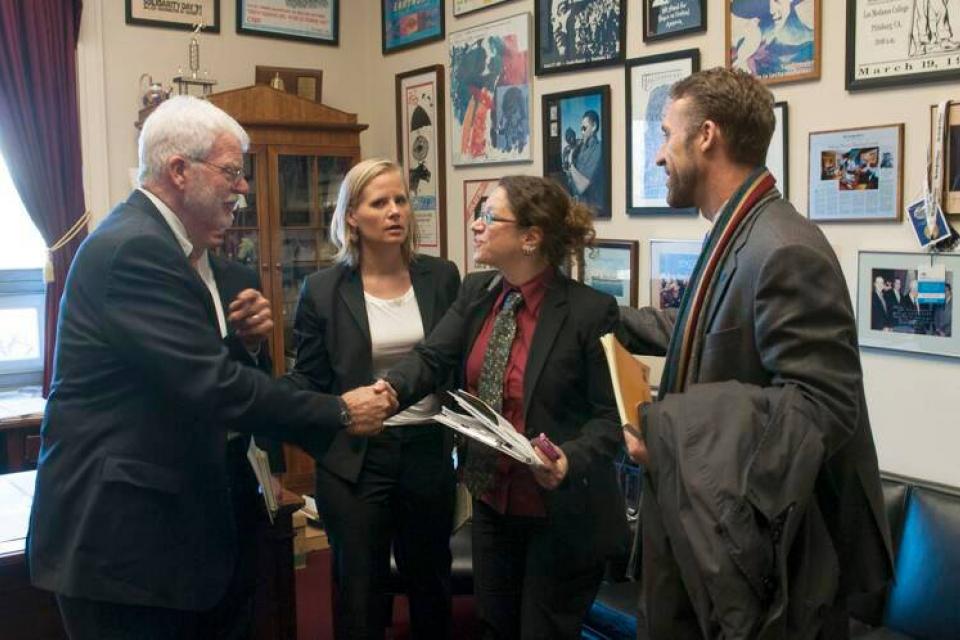Topic: Education Issues
CFT President to Reps. Pelosi, Speier, and Eschoo
"Thank you for critique of ACCJC"
Editor’s note: The following is a letter written to Congressional Representatives Nancy Pelosi, Jackie Speier and Anna Eshoo
Accrediting commission sticks foot in mouth, then jams it in farther
House Minority Leader Nancy Pelosi is furious with the ACCJC
May 29, 2014—In recent weeks the Accrediting Commission for Community and Junior College (ACCJC) leadership has claimed in a number of public settings that City College of San Francisco can withdraw its own accreditation and reapply for “candidacy status” and keep its federal and state funding, including student financial aid. It has also claimed repeatedly that it has no authority to give the college more time to address accreditation issues, and the commission’s July 2014 closure order for the college will stand.
Neither claim is true.
Course repeatability rules restrict student access, learning
Cabrillo College faculty lead effort to expose failings in new regulations
The new course repeatability regulations, passed by the Community College Board of Governors in July 2012, mean, in most cases, that if students pass a class with a ‘C’ or higher, they can’t take the class again. Many community college teachers see this negatively impacting students who want to study, for example, journalism, creative writing, foreign languages or visual arts.
Imagine nurses, mental health professionals, open libraries
Healthy Kids, Healthy Minds legislation provides necessary student supports in every school
Nearly all 29 of Sylvia Qualls’ fifth-grade students have experienced trauma. Some are in homeless shelters, others in foster care. Some face domestic violence. Their lives are affected by drugs, alcohol and gangs.
A triple play response to a rogue accrediting agency
Bills will support City College of San Francisco, all community colleges in state
By Joshua Pechthalt, CFT President
The CFT is in a pitched battle to repair our broken accrediting system for our public community colleges. The battle is being played out at City College of San Francisco, where 80,000 students and more than 2,000 faculty and classified members are at the mercy of a single agency that instead of ensuring quality education for all, has displayed manipulative practices, policy violations and illegal conduct.
Morgan Hill educators fight to keep community-based schools
Silicon Valley charter chains eye San Jose suburb
The latest flashpoint in the big-money expansion by charter school chains in Silicon Valley is Morgan Hill, a bedroom community with rural roots just south of San Jose.
Within the last year both Rocketship Education and Navigator Schools petitioned to open charter schools in the Morgan Hill Unified School District. Following swift mobilization and communication by the union and community groups, the school board denied both applications.
New legislation proposes universal transitional kindergarten
Senate President Pro Tem Darrell Steinberg, D-Sacramento, has introduced a bill to expand California’s Transitional Kindergarten program to give every four-year-old the opportunity to attend a year of school before kindergarten.
Judge rules trial required to determine legality of ACCJC actions
CFT lawsuit advances significant step toward fair accreditation in community colleges
City College of San Francisco started 2014 with some much-needed good news. San Francisco Superior Court Judge Curtis Karnow ruled that the school’s accreditation cannot be revoked until a trial determines whether the Accrediting Commission for Community and Junior Colleges, or ACCJC, acted unlawfully in sanctioning the college. Karnow said in his ruling that closing the college would be “catastrophic.”
CFT campaigns to bring back nurses, libraries
Union-sponsored legislation inspired by labor-community vision
The CFT has launched an ambitious legislative initiative for K-12 schools called Healthy Kids, Healthy Minds, which is embodied in the new union-sponsored bill, AB 1955, carried by Richard Pan, D-Sacramento, a pediatrician with a track record of improving health in local neighborhoods.
The Vergara lawsuit: Anti-public education ideology cloaked in civil rights rhetoric
Public school educators face a new threat in the form of the Vergara v. California lawsuit, which aims to declare unconstitutional five provisions of the Education Code that ensure seniority, due process and other rights for K-12 teachers. (See page 7)
AB 1942 calls for fair accreditation of community colleges
Legislative strategy adds pressure to lawsuits against ACCJC
Sacramento—In front of a packed room of supporters at the State Capitol, Assemblymember Rob Bonta, D-Oakland, announced the introduction of the Fair Accreditation for California Community Colleges Act, which would reform the accreditation system for California Community Colleges.
Judge issues injunction to keep CCSF open
CFT President Joshua Pechthalt (left) talks with media outside San Francisco Superior Court on December 26. In the courtroom that day, Judge Curtis Karnow listened to arguments for a preliminary injunction to keep City College of San Francisco open.
The judge issued the injunction on January 3.
CFT leaders testify at Washington D.C. Capitol hearing
ACCJC given a year to come into compliance
December 13, 2013—CFT Secretary Treasurer Jeff Freitas (right) and AFT 2121 President Alisa Messer (shaking hands with Congressman George Miller) met with Miller while in Washington D.C. to attend the hearing at which the Accrediting Commission for Community and Junior Colleges (ACCJC) was given a year to come into compliance with 15 standards it has violated.
Healthy Kids, Healthy Minds legislative program prioritizes nurses and libraries
By Joshua Pechthalt, CFT President
The CFT is launching a new legislative effort called Healthy Kids, Healthy Minds to ensure that all of California’s K-12 schools have a nurse and mental health professional, and a credentialed librarian in an open library during and after school.
Reference librarians meet complex queries with a human touch
Highly skilled professionals imperiled by administrative cost-cutting, online chat
“We no longer have a visible reference desk in our two main libraries,” reports Miki Goral, a UCLA librarian of 43 years. “Students first have to go to the circulation desk. If the student working there thinks they need to talk to a reference librarian, they often refer them to a 24/7 online chat, which is staffed by a UC librarian only during certain hours.
Otherwise they could be chatting with a librarian in New York, or even Australia. Plus chatting can take 40 minutes to do what you can do in 5 if you’re actually talking.”
Pilot colleges resist implementing two-tier fees in new law
FiFive of six districts not following program mandated in AB 955
In October, Gov. Jerry Brown signed the controversial Assembly Bill 955, which allows six colleges to charge students out-of-state rates for high-demand classes, such as English and algebra, during the winter and summer sessions. This means about $200 a unit, as compared to the current $46.
Fair accreditation: Congresswomen lead forum in support of City College
Fair accreditation, transparency demanded of out-of-control agency
Cañada College alumnus and Congresswoman Anna Eshoo called community colleges lifeboats and springboards for Californians. Congresswoman Jackie Speier said they keep our workforce vibrant. And state Sen. Jim Beall said seven of his nine siblings went to community colleges, the only way they could afford higher education.
Adult Education: New regional consortia meld state programs
Grassroots action required to meet community needs
By Cynthia Eagleton
Ever Since Wall street crashed into Main Street five years ago, adult education has been in a state of change. Until five years ago, adult education in California was stable: Classes were provided primarily through K-12 districts as a protected categorical, and in a few cities, as non-credit offerings at community colleges.
2014 brings new professional opportunities
By Paula A. Phillips, President, CFT Council of Classified Employees
As 2013 winds to a close and we look back on the year, there are many reasons for classified employees to be thankful. After years of cuts, more resources are flowing into schools and colleges, thanks to our efforts to pass Prop. 30. K-12 education will see a more equitable funding formula and a new law requires more consideration of classified staff in district professional development plans.
Morgan Hill Federation to host Education Summit
Union takes stand against charter schools
Next week, the Santa Clara County Board of Education will hear testimony on whether to increase the number of charter schools in the Morgan Hill Unified School District, just south of San Jose, based on a proposal from two charter corporations. The district board has already turned down the idea, and the corporations appealed to the county board.






